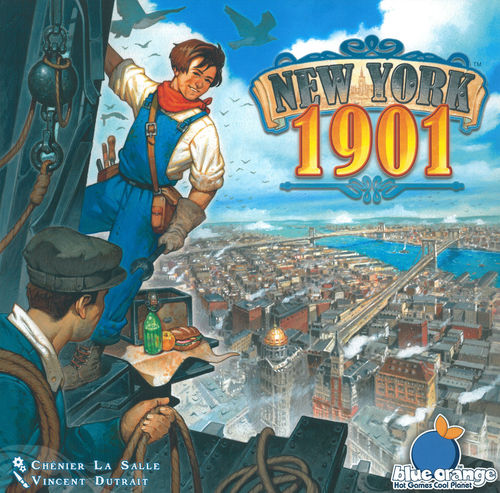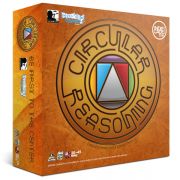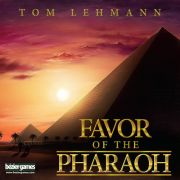New York 1901 (published by Blue Orange Games, designed by Chénier La Salle) – Set in 1901, players are building up the New York skyline, filling it with skyscrapers, and trying to acquire the most points. On your turn you acquire land and build. If you acquire land, you select one lot card from a series that are face up next to the game board. The game board is made up of lots and the lot card will show you what color and shape of lot you can claim on the board. One lot card may fit several available spaces, and you place one of your four workers to indicate which one you now own. If you choose to build, you may place one of your building tokens on one or more of your lots, if the building fits. However, you can hold off if you wish, trying to claim more lots nearby which would allow you to construct even bigger skyscrapers that will ultimately be worth more points. As the game progresses you start to build more and more elegant and larger buildings. Without losing points you can choose to demolish one of your buildings already placed and can replace it with a tower of higher quality. The quality of structure you are allowed to build is dictated by where you are on the score tracker.
2016 Mensa Select Winners

After forty-two hours of gaming, five games were selected from sixty-three competing games to win this year’s Mensa Select award.
2016 Mensa Select Winners:
Circular Reasoning (published by Breaking Games, designed by Tomer Braff and Edward Stevenson) – The game board is a circle made up of three rings and one center space. Each player has three pieces (a circle, a square, and a triangle), and the goal of the game is to get all three of your pieces into the center space. On your turn you may move only one of your pieces in either direction along a ring. Each of your pieces has a different set number of movements and you must move its full amount without switching directions once you’ve started. In order to move a piece into a lower ring, your piece must pass through a specific gateway. This gateway moves each turn equal to the number of players nearby, and complicating the matter is the fact that other players can block the gateway for you with their own pieces.
World’s Fair 1893 (published by Renegade Game Studios and Foxtrot Games, designed by J. Alex Kevern) – It's the Chicago World's Fair of 1893. You are trying to put on exhibits and score points. There are five areas, each devoted to different types of exhibits, such as fine arts or manufacturing. On your turn, you place one of your supporter cubes in one of the five areas. Any time you send a supporter to an area, you win all the cards that are currently at that area. After each player's move, one card is placed in each of the five areas. Cards include midway cards (which are automatically worth points and advance the game closer to the end), influential figures (who give you a one-time ability next turn to manipulate supporters), and exhibits. The game consists of three rounds. At the end of each round players score points for their midway cards and for having the most supporters in an area. How much of the area you control, determines how many (if any!) exhibits of that type you can show at the fair that round which will score at the end of the game.
Favor of the Pharaoh (published by Bezier Games, Inc., designed by Thomas Lehmann) – Players are competing to earn the favor of the Pharaoh. On your turn you roll dice and claim a tile. You can claim any tile that you do not already own and that meets the condition required for that tile. Some of your claimed tiles will tell you how many dice to roll, while others will grant you special abilities that will let you manipulate the dice results. Each time you roll the dice, you must lock at least one of them in by placing it in your pyramid. You may then keep rerolling your remaining dice. After the queen tile has been claimed, the end game begins and all players have a roll-off. The queen tile is claimed by the active player locking in at least seven dice of an identical value. Other players then roll, trying to lock in either more dice of the same value, or by locking in at least the same number of dice of a greater value. The player with the best set of matched dice wins the Pharaoh’s favor and wins the game.
The Last Spike (published by Columbia Games, designed by Tom Dalgliesh) – Players are cooperating to build a railway from St. Louis to Sacramento, but also competing to earn the most money through land speculation. Each player starts the game with money and four tiles of railroad track. Each track costs a different amount of money to build and each track tile also has a specific letter and number written on it that indicates where it can be placed on the board. You may only lay down tracks next to a city or next to already-laid tracks; otherwise you have to pay double. The first player to lay down track next to a city gets a free land card associated to that city. On any turn in which you do not acquire a free land card, you may buy a land card for any city whose free one has already been claimed. Each time a city land card is bought, the next one becomes more expensive for that city. After a stretch of track is completed between two cities, players earn money based on the land cards they have for one or both cities, earning more money the more land cards they hold. Not all cities earn the same amount of money, and not all cities might score by the end of the game while some may score more than once, so you have to choose wisely where you invest.






_large.png)


